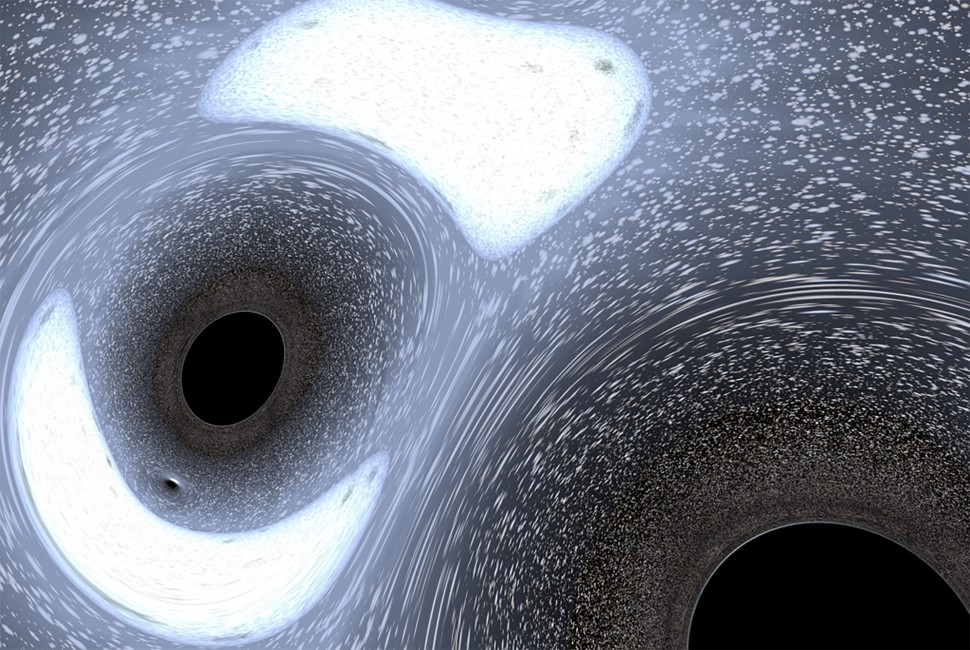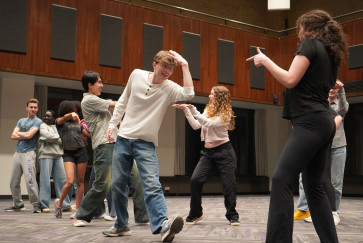Gravitational waves — ripples in the fabric of spacetime first predicted by Albert Einstein in 1916 — were detected for the first time on Sept. 14, 2015. A small group of Northwestern University faculty, postdoctoral fellows and students were a critical part of that historic discovery, made by a team of more than 1,000 scientists and engineers from around the world.
Since that thrilling detection of a gravitational-wave signal produced by the collision of two massive black holes, more than 90 signals from the mergers of black holes and/or neutron stars have been discovered using sophisticated detectors in the U.S. (LIGO Hanford and LIGO Livingston) and Italy (Virgo). Another detector in Japan, KAGRA, is expected to join the LIGO and Virgo detectors later this year in their next observing run.
Now hundreds of gravitational-wave researchers involved in these discoveries are coming to Northwestern for an international conference March 13-17.
The community of the three science collaborations holds working meetings twice a year, one in the U.S. and one elsewhere. This month’s conference, the first in-person meeting in the U.S. since the pandemic, will be hosted by Northwestern’s Center for Interdisciplinary Exploration and Research in Astrophysics (CIERA).
“The face-to-face presentations, discussions and brainstorming during the conference are critical as we feverishly prepare for our next period of gravitational-wave discoveries with detectors featuring the highest sensitivity ever,” CIERA director Vicky Kalogera said. She is the faculty lead of the Northwestern group in the LIGO Scientific Collaboration (LSC) and the Daniel I. Linzer Distinguished University Professor of Physics and Astronomy in the Weinberg College of Arts and Sciences.
While the scientific conference is closed to the public, CIERA is holding two related public events on Tuesday, March 14:
“Gravitational Waves, Black Holes and the Machines That Detect Them”
Gabriela González, one of four scientists who announced the first detection of gravitational waves to the public, will deliver a general talk about the new era of gravitational-wave astronomy. She will discuss the history and details of the observations since September 2014 and the detectors that make such observations possible. González is a founding member of the LSC and was the spokesperson at the time of the first discovery.
The talk will take place at 6:30 p.m. in the McCormick Auditorium of Norris University Center.
“Astronomy on Tap”
At this informal event, and on Pi Day (Einstein’s birthday), Northwestern astronomers will talk about pi, gravitational waves and black holes. Questions from the audience are welcome. A trivia contest will give attendees a chance to win a pie.
The event begins at 7 p.m. at Five & Dime, 1026 Davis St. in Evanston. Space is limited to the first 50 people.
“Northwestern and CIERA were offered the opportunity to host the meeting because of Northwestern’s consistent scientific involvement in the LIGO-Virgo-KAGRA collaborations,” said Zoheyr Doctor, CIERA Board of Visitors Research Assistant Professor in Kalogera’s group. “It is a huge honor for us to host this conference at Northwestern — our last opportunity to be together before the new observing run.”
Doctor and Madeline Wilson, CIERA’s events and marketing coordinator, are the lead organizers of the hybrid conference. Close to 400 scientists and engineers are expected to attend in person, and more will attend virtually.
David Reitze, executive director of the Laser Interferometer Gravitational-wave Observatory (LIGO) Laboratory, is one of the scientists who will attend.
“The Northwestern CIERA LSC group has done outstanding work on understanding what gravitational-wave detections tell us about how, and how many, black holes are produced in the universe,” said Reitze, a Caltech physicist and Northwestern alumnus. “I’m delighted to return to Northwestern to plan for the next LIGO-Virgo-KAGRA observational campaign.”
The advanced gravitational-wave detectors used by the LIGO-Virgo-KAGRA international collaboration have been shut down since March 27, 2020, so their sensitivity could be improved. The next observing run — the fourth such run — is scheduled to start on May 24 and last approximately 18 months. This new run will enable scientists to learn more about the nature of black holes, neutron stars, gravity and more.
“With the detectors’ increased sensitivity, we expect to listen to even fainter black-hole mergers, to go farther back in time,” Kalogera said. “We also are excited to take another big step for multi-messenger astrophysics, discovering neutron star collisions in both gravitational and electromagnetic waves. Multi-messenger astronomy and the study of black holes are both areas of leadership by CIERA researchers.”
CIERA is one of Northwestern’s 35 University-wide research institutes and centers (URICs) attracting talent from across Northwestern. Read more about these cross-disciplinary hubs in Vice President for Research Milan Mrksich’s recent essay on Leadership Notes.


